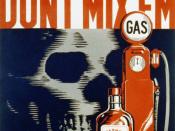The Severity of Drunk Driving
Drunk Driving has become a major focal point across America. Anti-drunk driving organizations are forming and laws are stiffening in efforts to put an end to it. Some people, however, believe that it is not as serious a crime as America is making it out to be. They also believe that harsher punishments are not the solution. Douglas Husak puts forth an argument that stresses why he believes drunk driving is not a serious offense and should not warrant jail time for the offender, while Bonnie Steinbock believes that drunk driving is a very serious offense, and could be grounds for murder. Husak's work fails to convince the reader that drunk driving is not a serious offense because he attempts to put together a formula for measuring its seriousness with weak points and a complete disregard for the value of human life.
Husak attempts to prove his point by defining terms such as seriousness and offense.
He refers to seriousness by using a model proposed by Andrew von Hirsch and Nils Jareborg which states, "seriousness of a crime has two dimensions: harm and culpability" (Husak, 57). Husak argues that the same harms caused by drunk drivers can also be caused by sober drivers; therefore driving drunk is no more serious than driving sober, from the harm standpoint. When it comes to culpability, Husak first considers Steinbock's argument that drunk drivers exhibit gross recklessness, which Husak, quoting Ibid, is "defined to include six elements: a defendant must (1) consciously (2) disregard a (3) substantial and (4) unjustifiable (5) risk that (6) a law abiding person in his situation would not have disregarded" (Husak, 59). Husak, focusing on the first element, again compares drunk drivers to sober drivers by saying that sober drivers are also conscious...


